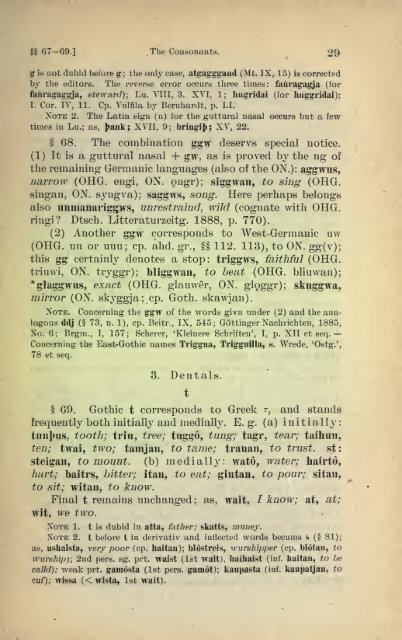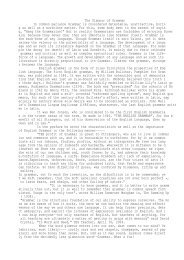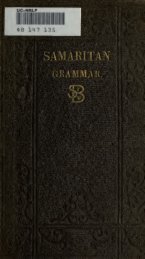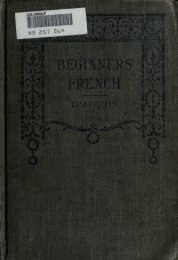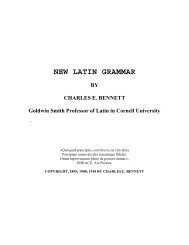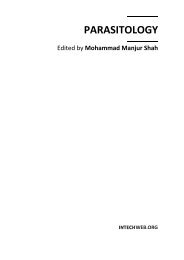A Gothic grammar with selections for reading and a ... - EducationNest
A Gothic grammar with selections for reading and a ... - EducationNest
A Gothic grammar with selections for reading and a ... - EducationNest
You also want an ePaper? Increase the reach of your titles
YUMPU automatically turns print PDFs into web optimized ePapers that Google loves.
6769.] The Consonants. 29<br />
g is not dubld be<strong>for</strong>e g; the only case, atgagggaud (Mt. IX, 15) is corrected<br />
by the editors. The reverse error occurs three times: fauragagja (<strong>for</strong><br />
fauragaggja, steward); Lu. VIII, 3. XVI, 1; hugridai (<strong>for</strong> huggridai):<br />
I. Cor. IV, 11. Cp. Vulfila by Beruhardt, p. LI.<br />
NOTE 2. The Latin sign (n) <strong>for</strong> the guttural nasal occurs but a few<br />
times in Lu.; as, J>ank ; XVII, 9; bringi]>; XV, 22.<br />
68. The combination ggw deservs special notice.<br />
( 1 ) It is a guttural nasal + gw, as is proved by the ng of<br />
the remaining Germanic languages (also of the ON.): aggwus,<br />
narrow (OHG. engi, ON. ongr); siggwan, to sing (OHG.<br />
singan, ON. syngva); saggws, song. Here perhaps belongs<br />
also unnianariggws, unrestmind, wild (cognate <strong>with</strong> OHG.<br />
ringi? Dtsch. Litteraturzeitg. 1888, p. 770).<br />
(2) Another ggw corresponds to West-Germanic uvv<br />
(OHG. uu or uuu; cp. ahd. gr., 112. 113), to ON. gg(v);<br />
this gg certainly denotes a stop: triggws, faithful (OHG.<br />
triuwi, ON. tryggr); bliggwan, to beat (OHG. bliuwan);<br />
*glaggwus, exact (OHG. glauwer, ON. gloggr); skuggwa,<br />
mirror (ON. skyggja; cp. Goth, skawjan).<br />
NOTE. Concerning the ggw of the words givn under (2) <strong>and</strong> the ana-<br />
logous ddj ( 73, n. 1), cp. Beitr., IX, 545; Gottinger Nachrichten, 1885,<br />
No. 6 ; Brgm., I, 157 ; Scherer, 'Kleinere Schriften', I, p. XII et seq.<br />
Concerning the East-<strong>Gothic</strong> names Triggua, Triggnilla, s. Wrede, 'Ostg.',<br />
78 et seq.<br />
3. Dentals.<br />
69. <strong>Gothic</strong> t corresponds to Greek r, <strong>and</strong> st<strong>and</strong>s<br />
frequently both initially <strong>and</strong> medially. E.g. (a) initially:<br />
timjws, tooth; trill, tree; tuggo, tung; tagr, tear; taihun,<br />
ten; twai, two; tamjaii, to tame; trauan, to trust, st:<br />
steigan, to mount, (b) medially: wato, water; liairto,<br />
hart; baitrs, bitter; itjin, to eat; giutau, to pour; sitaii.<br />
to sit; witan, to know.<br />
Final t remains unchanged; as, wait, I know; at, at;<br />
wit, we two.<br />
NOTE 1.<br />
NOTE 2.<br />
t is dubld in atta, father; skatts, muney.<br />
t be<strong>for</strong>e I in derivativ <strong>and</strong> inflected words becums J<br />
( 81);<br />
as, ushaista, very poor (cp. haitan); bldstreis, wurshipper (cp. blotan, to<br />
wurship); 2nd pers. sg. prt. waist (1st wait), haihaist (inf. haitan, to be<br />
calld); weak prt. ganiosta (1st pers. gauiot); kaupasta (inf. kaupatjan, to<br />
cuf); wissa (< wista, 1st wait).


